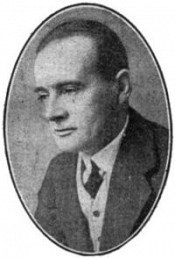Saki

Hector Hugh Munro (December 18, 1870 – November 13, 1916), better known by the pen name Saki, was a British writer, whose witty and sometimes macabre stories satirized Edwardian society and culture. He is considered a master of the short story and is often compared to O. Henry and Dorothy Parker. His tales feature delicately drawn characters and finely judged narratives. "The Open Window" may be his most famous, with a closing line ("Romance at short notice was her speciality") that has entered the lexicon. In addition to his short stories (which were first published in newspapers, as was the custom of the time, and then collected into several volumes) he also wrote a full-length play, The Watched Pot, in collaboration with Charles Maude; two one-act plays; a historical study, The Rise of the Russian Empire, the only book published under his own name; a short novel, The Unbearable Bassington; the episodic The Westminster Alice (a Parliamentary parody of Alice in Wonderland), and When William Came, subtitled A Story of London Under the Hohenzollerns, a fantasy about a future German invasion of Britain. He was influenced by Oscar Wilde, Lewis Carroll, and Kipling, and himself influenced A. A. Milne, Noël Coward, and P. G. Wodehouse.[1] The name Saki is often thought to be a reference to the cupbearer in the Rubáiyát of Omar Khayyam, a poem mentioned disparagingly by the eponymous character in "Reginald on Christmas Presents" and alluded to in a few other stories. (This is stated as fact by Emlyn Williams in his 1978 introduction to a Saki anthology [2] It may, however, be a reference to the South American primate of the same name, "a small, long-tailed monkey from the Western Hemisphere" that is a central character in "The Remoulding of Groby Lington"[3] Hector Hugh Munro was born in Akyab, Burma (now known as Sittwe, Myanmar), the son of Charles Augustus Munro and Mary Frances Mercer. His father was an inspector-general for the Burmese police when that country was still part of the British Empire. In 1872 his mother, who had gone home on a visit to England, was charged by a cow; the shock caused her to miscarry. She never recovered and soon died[4]. Charles Munro sent his children, including two-year-old Saki, to England, where they were brought up by their grandmother and aunts in a strict, straitlaced household. Munro was educated at Pencarwick School in Exmouth and at Bedford Grammar School. When his father retired to England, he travelled on a few occasions with his sister and father, between fashionable European spas and tourist resorts. In 1893 he followed in his father's footsteps by joining the Indian Imperial Police, where he was posted to Burma (as was another acerbic and pseudonymous writer a generation later: George Orwell). Two years later, failing health forced his resignation and return to England, where he started his career as a journalist, writing for newspapers such as the Westminster Gazette, Daily Express, Bystander, Morning Post, and Outlook. In 1900 Munro's first book appeared: The Rise of the Russian Empire, a historical study modelled upon Edward Gibbon's magnum opus The Decline and Fall of the Roman Empire. From 1902 to 1908 Munro worked as a foreign correspondent for The Morning Post in the Balkans, Warsaw, Russia (where he witnessed Bloody Sunday), and Paris; he then gave that up and settled in London. Many of the stories from this period feature the elegant and effete Reginald and Clovis, young men-about-town who take heartlessly cruel delight in the discomfort or downfall of their conventional, pretentious elders. In addition to his well-known short stories, Saki also turned his talents for fiction into novels. Shortly before the Great War, with the genre of invasion literature selling well, he published a "what-if" novel, When William Came, subtitled "A Story of London Under the Hohenzollerns", imagining the eponymous German emperor conquering Britain. At the start of World War I, although 43 and officially over age, Munro joined the Royal Fusiliers regiment of the British Army as an ordinary soldier, refusing a commission. More than once he returned to the battlefield when officially still too sick or injured to fight. He was sheltering in a shell crater near Beaumont-Hamel, France in November 1916 when he was killed by a German sniper. His last words, according to several sources, were "Put that bloody cigarette out!"[5] After his death, his sister Ethel destroyed most of his papers and wrote her own account of their childhood. Munro never married. His biographer A. J. Langguth cites evidence for the hypothesis that Munro was homosexual. At that time in the UK sexual activity between men was a crime, and the Cleveland Street scandal in 1889, followed by the downfall and disgrace of Oscar Wilde (who was convicted in 1895 after cause celebre trials) meant that "that side of [Munro's] life had to be secret"[6]. In recognition of his contribution to literature, a blue plaque has been affixed to a building in which Munro once lived on Mortimer Street in central London. Saki's world contrasts the effete conventions and hypocrisies of Edwardian England with the ruthless but straightforward life-and-death struggles of nature. Nature generally wins in the end. Saki's work is now in the public domain, and all or most of these stories are on the Internet. Some of his best-known short stories are listed below. "The Interlopers" is a story based on two men, Georg Znaeym and Ulrich von Gradwitz, whose families have fought over a forest in the eastern Carpathian Mountains for generations. Ulrich's family legally owns the land, but Georg – feeling it rightfully belongs to him – hunts there anyway. One winter night, Ulrich catches Georg hunting in his forest. The two would never shoot without warning and soil their family’s honor, so they hesitate to acknowledge one another. As an “act of God,” a tree branch suddenly falls on each of them, trapping them both under a log. Gradually, they realize the futility of their quarrel and become friends to end the family feud. They call out for their men’s assistance, and after a brief period, Ulrich makes out ten figures approaching over a hill. The story ends with Ulrich’s realization that the "interlopers" on the hill are actually wolves. At a railway station, an arrogant and overbearing woman mistakes the mischievous Lady Carlotta for the governess she expected. Lady Carlotta, deciding not to correct the mistake, presents herself as a proponent of "the Schartz-Metterklume method" of making children understand history by acting it out themselves, and chooses a rather unsuitable historical episode for her first lesson. Rather than giving her young boys gifts of toy soldiers and guns, their mother instructs her brother to give the children "peace toys" as an Easter present. When the packages are opened, young Bertie shouts "It's a fort!" and is disappointed when his uncle replies "It's a municipal dust-bin". The boys are initially baffled as to how to obtain any enjoyment from models of a school of art and a public library, or from little toy figures of John Stuart Mill, poetess Felicia Hemans, and astronomer Sir John Herschel. Youthful inventiveness finds a way, however. "The Storyteller" is a cynical antidote to crude didacticism. An aunt is traveling by train with her two nieces and a nephew. The children are naughty and mischievous. A bachelor is sitting opposite. The aunt starts telling a moralistic story, but is unable to satisfy the curiosity of the children. The bachelor intervenes and tells a story where the "good" person ends up being unwittingly devoured by a wolf, much to the children's delight. Saki's recurring hero Clovis Sangrail, a sly young man, overhears the complacent middle-aged Huddle complaining of his own addiction to routine and aversion to change. Huddle's friend makes the wry suggestion of the need for an "unrest-cure" (the opposite of a rest cure) to be performed, if possible, in the home. Clovis takes it upon himself to "help" the man and his sister by involving them in an invented outrage that will be a "blot on the twentieth century". In a hunting story with a difference, the Baroness tells Clovis of a hyena she and her friend Constance encountered alone in the countryside, who cannot resist the urge to stop for a snack. The story is a perfect example of Saki's delight in setting societal convention against uncompromising nature. The child is shortly devoured. A man with the unlikely name of Framton Nuttel comes to a country village for some peace and rest. He calls upon a lady named Mrs. Sappleton his sister used to know; for a few minutes he is left alone with her niece named Vera, who has quite an active imagination. She tells Framton a story about the tragedy of the lady's husband and two younger brothers, who had gone hunting one day three years earlier and never returned. The bodies were never found, and because of this the window from which they left is always kept open. When indeed they do return that very night, Framton, who has suffered from nerves in the past, runs out of the house, and the niece explains his sudden departure to her relatives with an equally imaginative fiction. The story of a young, sickly child, Conradin. His cousin and guardian, Mrs. De Ropp, "would never... have confessed to herself that she disliked Conradin, though she might have been dimly aware that thwarting him 'for his good' was a duty which she did not find particularly irksome." At a country house party a visiting professor announces to the guests that he has perfected a procedure to teach animals human speech. He demonstrates this on his host's cat, Tobermory. Soon it is clear that animals are permitted to view many private things on the assumption that they will remain silent... A 're-discovered' short story, previously cited as a play and therefore less well known. A house party with its typical social mix of bumbling Major Boventry, the precious Lucien Wattleskeat, the wordy Canon Clore and a breathless hostess, Mrs Gramplain, is beset by a fire in the middle of the night in the east wing of the house. Begged by their hostess to save "my poor darling Eva – Eva of the golden hair," Lucien demurs on the grounds that he has never even met her. It is only on discovering that Eva is not a flesh and blood daughter, but Mrs Gramplain's painting of the daughter that she wished that she had had and which she has faithfully updated with the passing years, that Lucien declares a willingness to forfeit his life to rescue her, since "death in this case is more beautiful," a sentiment endorsed by the Major. As the two men disappear into the blaze, Mrs Gramplain recollects that she "sent Eva to Exeter to be cleaned." Thus the two men have lost their lives for nothing. (Compare with Oscar Wilde's novel The Picture of Dorian Gray.)
do you like this author?
What readers are saying
What do you think? Write your own comment on this book!
write a commentWhat readers are saying
What do you think? Write your own comment on this author!
write a commentBook list

The Rise of the Russian Empire
Series:
Unknown
Year:
Unknown
Raiting:
3/5
Book digitized by Google from the library of the New York Public Library and uploaded to the Internet Archive by user tpb.
Show more
add to favoritesadd In favorites

The Rise of the Russian Empire
Series:
Unknown
Year:
Unknown
Raiting:
4/5
Book digitized by Google from the library of Harvard University and uploaded to the Internet Archive by user tpb.
Show more
add to favoritesadd In favorites

The Westminster Alice
Series:
Unknown
Year:
Unknown
Raiting:
3/5
Book digitized by Google from the library of the University of Michigan and uploaded to the Internet Archive by user tpb.
Show more
add to favoritesadd In favorites

When William Came
Series:
Unknown
Year:
Unknown
Raiting:
3/5
What we find frightening about this novel is the very premise: England has been subjugated and annexed! by Germany . . . When William Came, written before World War I, is a grim tale of a then-fictional war between Britain and Germany. Saki's biting wit is aimed squarely at British politics in this thinly veiled story -- he, like many others, could see war approaching, and who would want to see a conflict of such proportion? Unnerving stuff, we say. . . . --This text refers to an alternate Paperback edition.
Show more
add to favoritesadd In favorites

The Toys of Peace, and other papers
Series:
Unknown
Year:
Unknown
Raiting:
1.5/5
The Toys of Peace, and other papers is a nice collection of stories written by Saki which was published for the first time in 1919. The book is highly recommended for those readers who want to feel the special atmosphere of that time and understand the life of the contemporary society.
Show more
add to favoritesadd In favorites

Reginald in Russia and other sketches
Series:
Unknown
Year:
Unknown
Raiting:
5/5
Saki (1870 -1916), was the pen name of the British author Hector Hugh Munro, whose witty and sometimes macabre stories satirised Edwardian society and culture. The name Saki is often thought to be a reference to the cupbearer in the Rubáiyát of Omar Khayyam, a poem mentioned disparagingly by the eponymous character in Reginald on Christmas Presents. Saki is considered a master of the short story and is often compared to O. Henry and Dorothy Parker. His tales feature delicately drawn characters and finely judged narratives. In addition to his short stories, he also wrote several plays; a short novel, The Unbearable Bassington (1912); and two novella-length satires, the episodic The Westminster Alice and When William Came (1913).
Show more
add to favoritesadd In favorites
What readers are saying
What do you think? Write your own comment on this author!
write a commentif you like Saki try:
readers also enjoyed
What readers are saying
What do you think? Write your own comment on this author!
write a commentGenre
if you like Saki try:
readers also enjoyed
Do you want to read a book that interests you? It’s EASY!
Create an account and send a request for reading to other users on the Webpage of the book!

